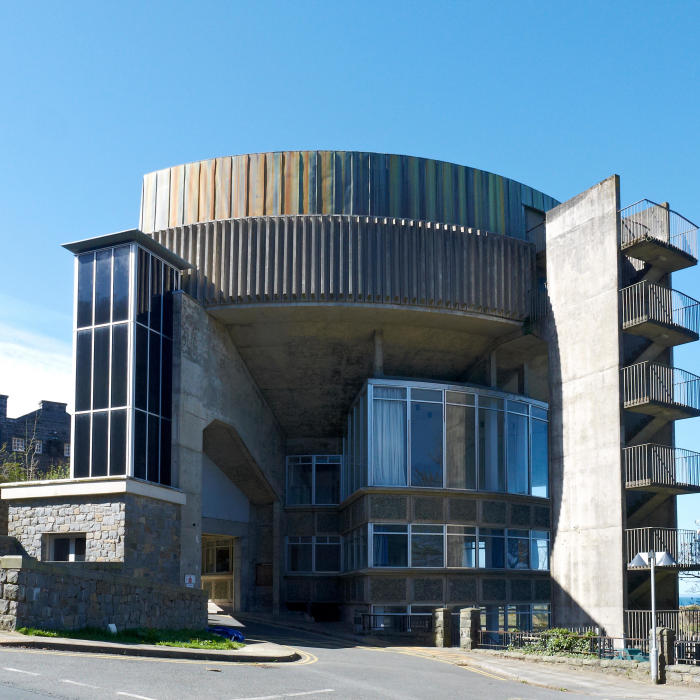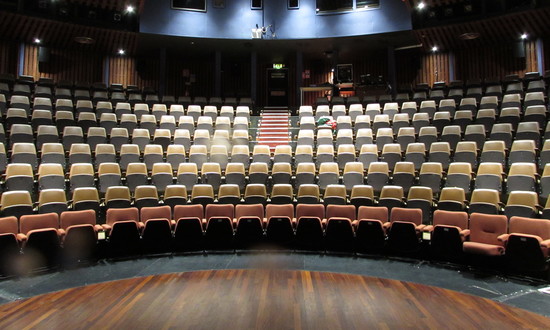Theatr Ardudwy
The first post-war theatre listed in Wales and a fine example of Brutalist architecture.

- Address
- St David's Hill, Harlech, Gwynedd, LL46 2PU, Wales
- Risk Rating
- 7 (Community Rating: 3, Star Value: 2, Risk Factor: 2)
- Local Authority
- Gwynedd Council
- Owner
- Coleg Harlech Limited
- Architect
- Colwyn Foulkes and Partners
- Date of Construction
- 1973
- Listing
- Grade II*
- Capacity
- 266
- Database Link
- View in Theatres Database
Significance
Theatr Ardudwy was built as an arts venue for the adult education centre Coleg Harlech.
The college opened in 1927 and was Wales’ only long-term residential education college for mature students. It originally comprised Plas Wernfawr, a 1908 house built in the Arts and Crafts Georgian style, and a Great Hall wing which was built in 1910. The campus was expanded to include a library added around 1939 and, more latterly, a gymnasium and an amenity centre. The theatre was built to replace the Great Hall which was destroyed by fire in 1968.
Designed by Colwyn Foulkes and Partners in 1973, the theatre is an exceptional example of classic Brutalist architecture and a dramatic addition to the rural landscape, contrasting with the neighbouring Coleg buildings. The part circular, part hexagonal 256-seat auditorium is wrapped in ribbed concrete with an upper set-back storey of copper sheet cladding and forms a striking composition from the road. Meeting rooms are situated on two lower tiers, externally comprising aluminium framed windows and rough concrete panels, their form echoing the curved geometry of the auditorium above. Internally, the original high-quality finishes including slatted wooden walls, terrazzo flooring and a radial timber slatted ceiling in the foyer remain in situ and are in good condition.
While Plas Wernfawr, the library, the forecourt, and garden structures were listed, it wasn’t until 2016 that the theatre itself was included in the listing, recognised by Cadw as ‘a striking and unusual example of architectural Brutalism, using form and structure to give clear expression of purpose.’
In 2018, Cadw in partnership with Snowdonia National Park Authority produced a Planning Guidance Note to provide a planning framework to inform any future development of Coleg Harlech and, within this recorded the theatre as a significant heritage asset on the site.
The theatre is a remarkable and striking building, and a rare example of this style of building outside of urban environment. It is the only arts provision in the local area.

Why is this theatre at risk?
Theatr Ardudwy has been on the Theatres at Risk Register since 2019.
The future of the theatre and the Coleg Harlech site had been perilous for several years prior to the theatre’s inclusion on the Theatres at Risk Register. Addysg Oedolion Cymru, the organisation that owned and ran Coleg Harlech, had been in conversation with the Welsh Government about an urgent repair and planned maintenance programme for both the college and the theatre building
In February 2018, safety concerns finally forced the theatre to close. There had been little investment in the external fabric of the building for many years. The roof was in need of repair and there were concerns over the deteriorating condition of the exterior of the building, including some of the concrete elements where the steel reinforcement had rusted. There were also reports of lead and copper theft from both the theatre workshop and main college roofs during this time.
There then followed a series of changes in ownership including an auction in autumn 2020 where the site was split into separate lots. The historical parts of the site – including the theatre – were kept as one lot, splitting them from more lucrative plots which, through enabling development, may have helped cross-subsidise necessary repair works to the listed buildings
In June 2021, the theatre and associated listed college buildings were sold to a private owner. They have indicated an ambition to reopen both theatre and college buildings for the local community. There are still challenges to be overcome regarding the condition of the building and substantial funding required for necessary repair work.
Theatre potential
The local community currently has no access to the arts without significant travel.
Arts Council of Wales has awarded the theatre various grants over the years and believes that the theatre and wider college site has the potential as a community and cultural sector asset.
Current situation
The theatre and listed parts of the site, including Plas Wernfawr and the library, were acquired by the current owner in June 2021. The ambition for the buildings is a community-focused reuse of the college, reopening the buildings as soon as is practicably possible and with full restoration as a longer-term ambition. Theatres Trust provided some initial funding advice and support with lease and insurance queries.
A meeting in July 2021 between the owner, Gwynedd Council, Cadw, Arts Council Wales, Snowdonia National Park Authority, and Theatres Trust to discuss the owner’s approach for a progressive restoration of the college and theatre met with support.
Since this time the owner has commenced work to clean up the site alongside initial enabling works, including commissioning a new survey of the concrete panels.
In February 2022, Cadw funded a programme of immediate emergency works to secure and stabilise the condition of Plas Wernfawr. The repair of the roof to the college has now been completed. There remain significant issues in relation to repair and renewal of the building with the next phase being to repair the roof on the theatre.
The owner is looking to commission an architect's report and a business plan to find a viable and sustainable future use for the college and theatre buildings that will help evidence and inform a way forward to restoring and reopening them - a necessary first step in unlocking any future public grant funding.
It is hoped that positive progress towards a phased restoration of the site will continue and ultimately realise the owner’s original vision of a reopened theatre hosting a broad range of cultural events to serve the local community, enhance tourism in the area and providing a wider reach into North Wales.
Theatres Trust looks forward to seeing the plans for both the Coleg and the theatre as they develop and will provide advice and support to assist in creating a viable future for the building.
Update April 2025
We have awarded a Resilient Theatres: Resilient Communities grant to South Wales Building Preservation Trust for a condition survey to assess the work required, and for design proposals to bring the theatre up to modern standards. Read the full news story.
Main photo Theatre Ardudwy, Brinkstock / Alamy Stock Photo. Interior, Theatres Trust, Rob Firman